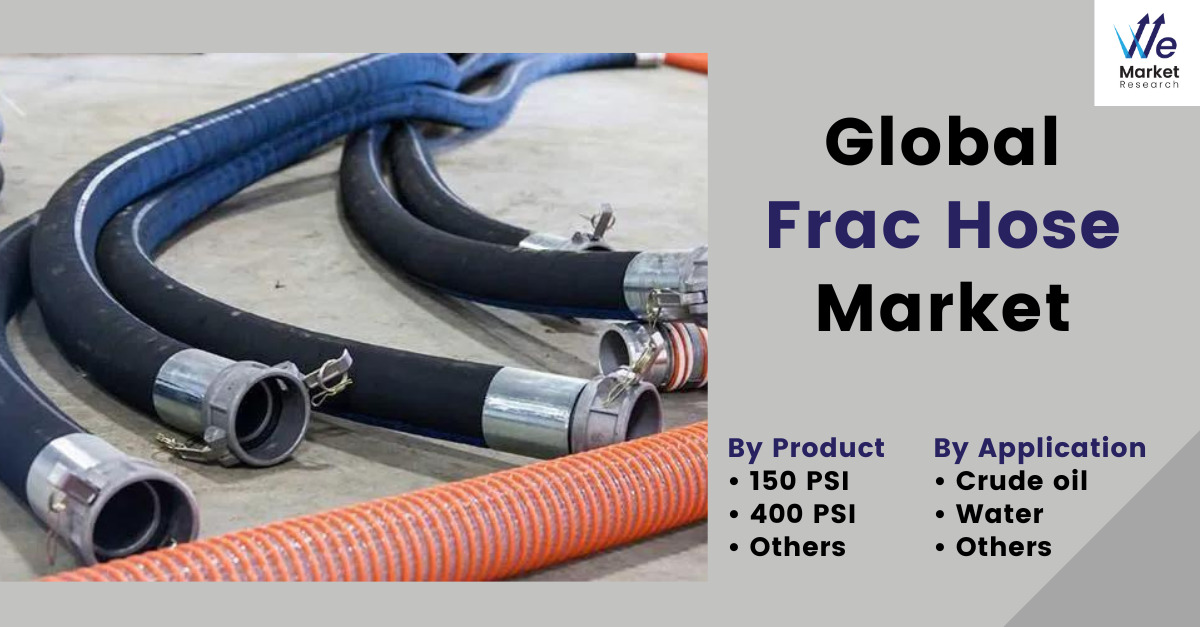Hoses used for fracking are used in hydraulic fracturing (fracking). With major projects utilising up to 5 million US gallons, hydraulic fracturing uses between 1.2 and 3.5 million US gallons (4.5 and 13 Ml) of water per well (19 Ml). Refracturing wells involves using more water, and it may be done multiple times.
Every drilling and completion operation requires water since the process uses millions of gallons of water for each well. Getting water to well sites can be challenging because so many are located in outlying places. The ideal situation would be for a water source to be close enough to the site that long hose lines could be employed to transport the water up to 10 kilometres to the location. A number of large-diameter pipes and high-volume pumps are used to achieve this. The issue is that these runs frequently take place in rocky terrain and densely forested areas.
Frac Hose market is expected to grow at a considerable rate by 2030, with a growing CAGR (compound annual growth rate) from 2022 to 2030.
Frac Hose Market is developing at a quicker pace with significant development rates throughout the most recent couple of years and is assessed that the market will fill essentially in the gauge period for example 2022 to 2030.
Some of the key drivers anticipated to drive the market expansion during the projected period are expanding infrastructure-related projects, rising demand for PVC material, and rising need for industrial hoses for crucial applications in numerous sectors. The hoses are used in a variety of sectors to prevent tragic mishaps and guarantee safe material handling under difficult operating and environmental conditions.
The market for hoses is being driven by the growing modernization of agricultural processes. The market for hose is expected to increase as a result of the quick urbanisation and industrialization that is occurring in many regions, including North America, Europe, Asia Pacific, and Central & South America. The market expansion for hoses is anticipated to be fuelled by an increase in infrastructure-related projects as well as FDI investments in developing countries.
The United States Department of Labor has a sizable regulatory body called the Occupational Safety and Health Administration (OSHA). The need for highly robust, secure, and long-lasting hose assemblies is being driven by OSHA’s mandate to ensure that workers are doing so in a regulated, safe, and healthy workplace.
The focus of the manufacturers is on the use of low-cost raw materials, such as Polyvinyl chloride (PVC), Polyurethane (PU), Natural Rubber (NR), Styrene-butadiene (SBR), Ethylene Propylene Diene Monomers (EPDM), Nitrile Butadiene Rubber (NBR), Silicon (Si), Chloroprene Rubber (CR), Cross-linked polyethylene (XLPE), and others. The choice of raw materials is important because the hoses must be able to endure the elements and the materials that run through them during the various stages of the completion operations.
The development of the chemical and oil & gas industries is also fuelling market expansion. However, product failures and recalls, as well as a lack of industrial hose technical expertise, are projected to impede market growth in the years to come.
Request Free Sample: https://wemarketresearch.com/sample-request/frac-hose-market/426/
Segmentation Analysis Of Global Frac Hose Market:
Based on type
- 150 PSI
- 400 PSI
- Others
Based on application
- Crude oil
- Water
- Others
Asia-Pacific is expected to hold the largest market share
North America, Europe, Latin America, Asia Pacific, and Middle East and Africa are the major regions constituting the geographical landscape of Global Frac Hose Market. North America dominates the market with the largest market share among others.
Competitive Landscape:
The Key players in the Global Frac Hose Market are NOV Rig Technologies, Novaflex, Unisource Manufacturing Inc., ContiTech, Jingbo Petroleum Machinery Co.,Ltd., Texcel, Alfagomma, Jason Industrial, Midwest Hose, Gates Corporation, Seal Fast, Parker Hannifin, Dixon, Nantong Sentian Fire-Fighting Equipment, and others.
Major Development:
The Global Frac Hose market is expected to increase at a significant rate during the figure time period, somewhere in the range of 2022 to 2030. In 2020, the market was developing at a consistent rate and with the increasing reception of systems by key players, the market is supposed to ascend over the projected skyline.
For More Information About This Report Visit:- https://wemarketresearch.com/reports/frac-hose-market/426/
Major Questions Answered In This Report:
- What is the growth rate of this Market?
- What are the primary growth determinants of the Global Frac Hose market?
- Which are the major regions constituting the geographical landscape of Global Frac Hose Market?
- Which are the prominent companies operating in Global Frac Hose Market?
About We Market Research
WE MARKET RESEARCH is an established market analytics and research firm with a domain experience sprawling across different industries. We have been working on multi-county market studies right from our inception. Over the time, from our existence, we have gained laurels for our deep rooted market studies and insightful analysis of different markets.
Our strategic market analysis and capability to comprehend deep cultural, conceptual and social aspects of various tangled markets has helped us make a mark for ourselves in the industry. WE MARKET RESEARCH is a frontrunner in helping numerous companies; both regional and international to successfully achieve their business goals based on our in-depth market analysis. Moreover, we are also capable of devising market strategies that ensure guaranteed customer bases for our clients.
Contact Us:
We Market Research
Phone: +1(929)-450-2887
Email: sales@wemarketresearch.com



